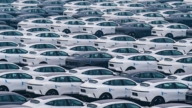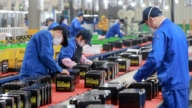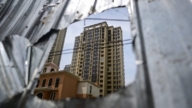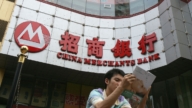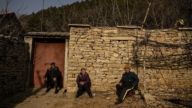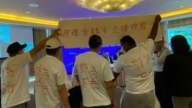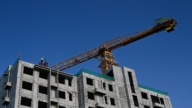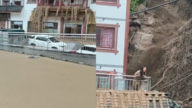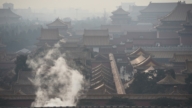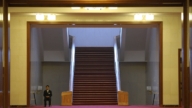【新唐人2013年01月19日讯】管理咨询公司“麦肯锡(McKinsey)”驻上海亚洲地区董事长欧高敦(Gordon Orr),对2013年中国的10种预测中,包括“猪肉或鸡肉的价格会翻一番”、“一个三线城市将宣布破产”、“中资银行不良贷款可能激增”等。不过学者认为,中国实际情况要比预测还要严重。请看报导。
1月17号,美国《华尔街日报》发表《2013年的中国:麦肯锡高管的10种预测》一文。
上海亚洲地区董事长欧高敦的第一项预测就是:抗议活动将升温,并取得更多成功。欧高敦说,受到近年来一些抗议活动成功的鼓励,加上颇具影响的社交媒体的作用,人们现在开始愿意“大声”抗议。
经济学家简天伦:“实际上在过去十几年来,每一年抗争活动都在增加:不管是维权还是抗拆迁、还是信仰、还是经济问题,贫富不均各方面,各种各样的社会矛盾在不断激化。从经济方面来讲,两极经济分化,收入分化特别严重,每一年都在加剧分化。”
经济学家简天伦还表示,多年来,中国绝大多数民众的收入与经济发展不成比例,社会分配极为不公,抗议增加是必然的。像最近的《南方周末》事件,表明民众自我维权意识在觉醒。
欧高敦还预测,有一个三线城市将破产。
时事评论员蓝述:“刚刚开完不久的中央经济工作会议上,地方政府要中央买单大约超过4万亿的财政赤字。超过4万亿的地方政府财政赤字,说明90%的地方政府实际上已经处在一个破产的状态,在这种情况之下,一旦是中央不给地方买单,那么很多的三线城市就有可能破产。”
蓝述认为,中共不是搞市场经济,它投资的目地不是为了长期发展,只是为了维持中共统治的合法性所需要的GDP,所以很多政府盲目的投资。但三线城市破产对中国的冲击是巨大的,对整个社会的冲击远超过希腊效应。
简天伦则指出,中共还像目前这样靠投资推动经济增长,不增加投资品质,不仅会对环境、生态平衡造成破坏,而且还会对整个国家经济发展和人民生活水准带来非常不好的影响。
另外,欧高敦还预测,2013年中国的银行不良贷款可能会激增﹔基础设施支出还会大幅度增加﹔肉或鸡肉的价格会翻一番等。
美国“普林斯顿大学”社会学博士程晓农认为,中国银行问题比欧高敦说的严重得多。
旅美中国经济社会学者程晓农:“这就是中国今天的现实:地方政府必须盖房子,不然就没有收入。所以为了有收入,就得盖,而且还得一年一年盖下去。 因为地方政府搞城镇化,盖新房的钱就是从银行拿来的,那钱是还不了的。所以,银行的风险自然就加大了。”
程晓农指出,现在中共政府要搞全国城镇化,这需要60万亿投资,但是,这些钱根本筹不到。这是因为,老百姓在银行的钱都被借给企业去盖房子了,银行自己的钱被借出去搞房地产已经成了坏账。现在中国还要盖房子,那只有一条路——通货膨胀。
程晓农表示,中国老百姓会承受通货膨胀的连锁反应,活不下去还得赖活着、忍受着。
旅日独立学者罗天昊日前也撰文指出,目前很多城市高昂的生活成本、恶劣的生存环境,已经使它对农村人口的吸引力大大降低。城市化出现了逆转的迹象,今天已经逐步出现的部分“黑灯城市”,未来将在中国蔓延,“空城”遍地,方才是中国未来的真实写照。
未来还会出现多少像鄂尔多斯、铁岭新城那样的“死城”,我们还不得而知。
采访/易如 编辑/宋风 后制/周天
A Very Bleak Outlook for China in 2013
Gordon Orr, chairman of McKinsey consulting firm
in Shaighai, made ten predictions about China in 2013.
Among them, the price of pork or chicken will double.
A third tier city will declare bankruptcy, and
the non-performing loans of Chinese banks may surge.
However, scholars believe that China’s actual situation
is worse than the predictions. Let’s read the report.
On January 17th the Wall Street Journal published the article
“China’s 2013: McKinsey executives 10 predictions”.
Chairman Gordon Orr’s first prediction is that protests
will heat up, and become more successful.
In recent years, protesting activities have been encouraged by
their rate of success, plus the role of influential social media.
People are now more willing to “loudly" protest.
Economist Jian Tianlun: “In fact, in the past ten years,
protests have been on the rise.
They are either for human rights, anti-demolition,
belief, or economic issues.
The disparity between the rich and the poor and
the variety of social conflicts continue to intensify.
From the economic point of view, income disparity is
particularly serious and continues to intensify each year."
Jian Tianlun said, over the years, it is disproportionate to the
revenue and economic development of most Chinese people.
It is extremely unfair social distribution.
Thus, the increase of protests is inevitable.
The recent “Southern Weekly" incident showed that
people were awakening to human rights.
McKinsey’s report also said that
third-tier cities will go bankrupt.
Lan Shu: “The recent Central Economic Work
Conference showed that local governments were asking more than 4 trillion yuan.
That means over 90% of local governments
are in a state of bankruptcy.
If the Central Government denies their requests,
more cities will go bankrupt.”
Lan Shu believes that the Chinese regime
is not interested in market economy.
Its purpose of investment is not for long-term development
but the need to maintain GDP for its legitimacy to rule.
Therefore, many local governments have invested blindly.
Bankruptcy of third-tier cities will greatly impact China,
and its effect will be far greater than that of Greece.
Jian Tianlun pointed out that the Chinese regime currently
relies on investment to promote economic growth.
If the quality of investment does not improve, it will cause
not only environmental damage and ecological imbalance,
but also have a very negative impact on the entire country’s
economic development and people’s standard of living.
In 2013, bad bank loans may surge,
a significant increase in infrastructure spending.
Price increases for meat or chicken
are all part of predictions.
Economic sociologist, Dr. Cheng Xiaonong, believes that
China’s banking issue is far more serious than predicted.
Cheng Xiaonong: “This is the reality of China today.
Local governments must build houses; otherwise, they have
no revenue. Thus, they have to build houses year after year.
Local governments push urbanization,
so they borrow money from banks.
However, they cannot repay those loans,
so the risk for banks naturally increases.”
Cheng Xiaonong pointed out that
the Chinese regime wants nation-wide urbanization.
That takes 60 trillion of investment. However,
money in banks has been borrowed to build houses.
The Banks’ own money thus turns into bad debt
from real estate, but more houses need to be built.
Now China has only one way to go and that is inflation.
Cheng Xiaonong said the Chinese people will bear the
burden of inflation even though they can no longer survive.
A visiting scholar in Japan, Luo Tianhao
pointed out that these days,
the high cost of city living and harsh environment
can no longer attract villagers.
Urbanization is going a reverse direction.
Many cities are gradually turning dark.
This scenario will spread to the rest of China.
The “Ghost town" will be all over China,
and that will be a true portrayal of China’s future.
We don’t know for sure how many more “ghost towns”
like Ordos or Tieling City will appear in the future.


